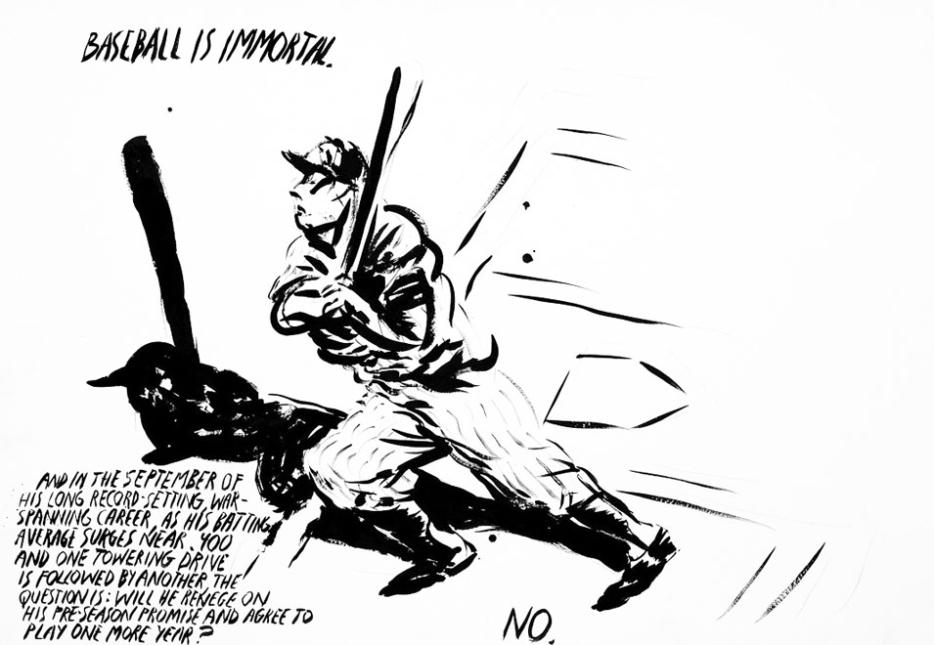To borrow from the writer William H. Gass, history flies over pro ball players like the angel of death: look at the Jays’ left-handed hitter Adam Lind, a Silver Slugger in 2009 with 35 home runs (that’s good), who spent six weeks in early 2012 at .186 (not good) before being sent to the minors, to Las Vegas, where we know dreams are rubbed raw against the coarse facts of life and chance. Now he’s back, having found, he says, both patience and the benefits of yoga. The problem: he had just the one lonely hit in his first 18 trips to the plate this season.
But what makes Lind a remarkable player is that he seems to engage with failure, not as a bit of bad luck but as a steady companion. He is a Schopenhauer ball player: “each individual misfortune, to be sure,” the 19th-century philosopher writes, “seems an exceptional occurrence; but misfortune in general is the rule.” History’s dark shadow circles overhead and Lind is a better player for knowing it will always be there: he’s loose, serene, ready for his luck to change but at peace if it doesn’t. He’s not paralyzed with fear and can therefore address the next pitch with a clear head. In both baseball and life, this is called wisdom.
Making friends with failure is different than squinching your eyes shut and hoping it will go away. The latter is called the Oprah Law of Cause and Effect, which says that bad luck is always just a prelude to success. Think positive, visualize, seize the day, listen to Adult Contemporary music and ride out the bad, because the good always comes… always! The genius of the Law is that you can’t prove it wrong: you can fail all your life, but there’s still tomorrow. This is the logic of slot machines. Keep feeding it twenty dollar bills, like a reverse-ATM, and if it won’t pay out that only means it’s hot. Only an idiot would quit while he’s behind.
Gambling is rational. It’s an act of pure potential. Believing in failure as a necessary condition of life, on the other hand, is not rational, it’s mystical and counter-intuitive, until you make friends with it—not to encourage failure but to keep it from surprising you. Which is what artists and some veteran ball players are able to understand: misfortune is always there, we can manage it or ignore it, but if we ignore it the inevitable bite is that much deeper. In his short novel Seize The Day, Saul Bellow runs his hero Tommy Wilhelm through an existential wringer like God hammering Job, not as a moral lesson but to say: this is how it is. Not only does shit happen but for most of us it never goes away. Tommy is a forty-something failure at marriage and business, who once took a shot at an acting career (an agent pegged him as the “type that loses the girl”) but as a .186 batter in the game of life it doesn’t pan out. “He liked to wear good clothes,” Bellow writes, to give us the picture, “but once he had put it on each article appeared to go its own way.”
So Tommy puts his faith in the stock market: the American religion. His partner is Dr. Tamkin, an amateur psychologist, a specialist in commodities and a man who accepts failure as long as it happens to other people for his benefit: there are only winners in the market as long as there are losers to finance them. In conversation, he is his own favourite subject (“...he practically invites you to take off your hat when he talks about himself,”) and he urges Tommy to stop inquiring into the nature of fate and just act, be positive, turn the frown upside down: “The past is no good to us,” Tamkin says. “The future is full of anxiety. Only the present is real--the here-and-now. Seize the day.”
They put their money (or rather, Tommy’s money, what’s left of it) into December rye and lard futures, which rally then sputter then flop. What Tommy learns is that while he was seizing the day Dr. Tamkin was seizing the opportunity to find another mark, and now he’s nowhere to be found. But Bellow rewards Tommy with the only thing he has left to offer: insight.
...since there were depths in Wilhelm not unsuspected by himself, he received a suggestion from some remote element in his thoughts that the business of life, the real business--to carry his particular burden, to feel shame and impotence, to taste the quelled tears--the only important business, the highest business was being done. Maybe the making of mistakes expressed the very purpose of his life and the essence of his being here.
Thomas Bernhard’s 1983 novel The Loser is Bellow without sleep, too much coffee, and a borderline personality disorder. The title could describe any of the three main characters including the narrator, in whose head the whole story unfolds in a single, breathless, 170-page paragraph, while he sits at a table in an inn. The narrator and his friend Wertheimer are skilled pianists who, as they see it, made the fatal mistake of studying music at a school in Leopoldskron with a young Glenn Gould. The mistake was hearing Gould play the Goldberg Variations, thereby setting a standard that neither Wertheimer nor the narrator can ever match. “Glenn is the victor, we are the failures,” the narrator thinks, looking back on the sweep of history in flight. Two bars of Gould was all it took for them to abandon their musical careers and get rid of their pianos. The narrator embarks on an obsessive, never-to-be-finished essay called “About Glenn Gould” while for Wertheimer the Leopoldskon experience haunts him literally to death. He rejects his friends, torments and then rejects his sister, and of course, this being a Bernhard novel, takes a train to Zizers, in Switzerland, and hangs himself outside his sister’s house.
“In theory he mastered all the unpleasantness of life,” the narrator says, “all the degrees of desperation, the evil in the world that grinds us down, but in practice he was never up to it [the author’s italics]. And so he went to pot… Ultimately he was enamored of failure, if not even a little bit smitten, I thought, had clung to this failure if his until the end. I could actually say he was unhappy in his unhappiness but he would have been more unhappy had he lost his unhappiness overnight, had it been taken away from him from one moment to the next which is again proof that basically he wasn’t unhappy at all but happy, and by virtue and with his unhappiness, I thought.”
Which is the long, breathless way of saying that Wertheimer couldn’t wait for the infidelity of chance, he had to create his own failure as a project, to which he was as devoted as Gould to his music and the narrator to his unfinished essay on Gould. I’m a loser, therefore I am. Wertheimer was a failure artist, he was good at it, he enjoyed it.
This is not Adam Lind, who sees the shadowy bird overhead but doesn’t tempt it down to earth with ballpark popcorn. Failure is not something to nurture, but neither can it be ignored: it may come again, another bus ride to Las Vegas, or it may pick on the meathead rookie who’s out to seize the day. There’s only wisdom in knowing it’s there, and swinging anyway.






